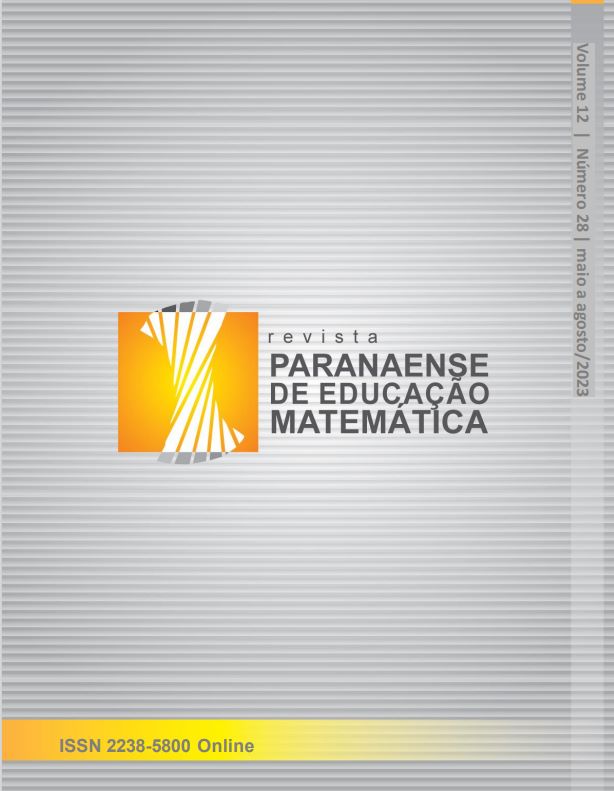TEACHING-LEARNING OF 2ND DEGREE EQUATIONS VIA PROBLEM SOLVING: AN EXPERIENCE BASED ON A HYPOTHETICAL LEARNING TRAJECTORY
DOI:
https://doi.org/10.33871/22385800.2023.12.28.427-446Keywords:
Mathematics Education, Final Years of Elementary School, Teaching PracticesAbstract
This paper assumed the objective of presenting an experience of using the Hypothetical Learning Trajectory in the Teaching-Learning of 2nd Degree Equations via Problem Solving. For this, theoretical references were built on Hypothetical Learning Trajectory and Teaching-Learning Mathematics via Problem Solving, making it possible to trace in the methodology a Hypothetical Trajectory of Teaching-Learning of 2nd degree Equations articulated in both theories. This trajectory was applied in groups of 9th grade students. The data consisted of questions, doubts and resolutions that were confronted with the hypotheses listed a priori. The results of the confrontation revealed that: a large part of the students' activities and uncertainties can be predicted and base-solutions established that support the teacher's explanations; the problem as a starting point makes it possible to guide and dynamize the teaching of mathematics, attributing meaning to the learning of the content, articulating it to a context.
Downloads
References
ANJOS FILHO, O. C. dos. Propostas de aulas na educação básica de alguns conceitos matemáticos visando seu contexto histórico e aplicações nos dias atuais. 2017. 119 f Dissertação (Mestrado Profissional em Matemática em Rede Nacional) – Universidade Tecnológica Federal do Paraná, Curitiba, 2017.
BALL, D. L.; THAMES, M. H.; PHELPS, G. Content knowledge for teaching: What makes it special? Journal of teacher education, v. 59, n. 5, p. 389-407, 2008.
BRITO, R. G. S. de; BRANCO, M. N.; BRITO, E. M. S. de. Dificuldade de estudante em resolver equação quadrática no ensino médio: uma pesquisa quantitativa. Science and Knowledge in Focus, v. 2, n. 1, p. 05-17, 2019.
CARRILLO, J. et al. Determining specialised knowledge for mathematics teaching. In: UBUZ, B.; HASER, C.; MARIOTTI, M. A. (Eds.), VIII Congress of the European Society for Research in Mathematics Education - CERME 8, 2013. p. 2985-2994.
GONÇALVES, B. M.; DE PROENÇA, M. C. Análise dos conhecimentos conceitual e procedimental de alunos do primeiro ano do Ensino Médio sobre equação do 2º grau. Revista Sergipana de Matemática e Educação Matemática, v. 5, n. 2, p. 209-228, 2020.
HATFIELD, L. Heuristical emphases in the instruction of mathematical problem solving: Rationales and research. In: Mathematical problem solving: Papers from a research workshop. Columbus, OH: ERIC Clearinghouse for Science, Mathematics and Environmental Education, 1978. p. 21-42.
LOPES, A. O. Planejamento de ensino numa perspectiva crítica da educação. In: VEIGA, I. P. A. (Coord.). Repensando a didática. Campinas: Papirus, 2014, p. 55-66.
ONUCHIC, L. R.; ALLEVATO, N. S. G. Pesquisa em Resolução de Problemas: caminhos, avanços e novas perspectivas. Bolema, Rio Claro (SP), v. 25, n. 41, p. 73-98, 2011.
PROENÇA, M. C. Resolução de Problemas: encaminhamentos para o ensino e a aprendizagem de Matemática em sala de aula. Maringá: EdUEM, 2018.
TZUR, R. Hypothetical learning trajectory (HLT): A lens on conceptual transition between mathematical “markers”. In: SIEMON, D.; BARKATSAS, T.; SEAH, R. Researching and using progressions (trajectories) in mathematics education. Brill, 2019. p. 56-74.
SCHROEDER, T. L.; LESTER JR, F. K. Developing understanding in Mathematics via problem solving. In: TRAFTON, P. R.; SHULTE, A. P. (Org.). New directions for elementary school mathematics. Reston: NCTM, 1989, p. 31-42.
SHULMAN, L. Knowledge and teaching: Foundations of the new reform. Harvard educational review, v. 57, n. 1, p. 1-23, 1987.
SIMON, M. A. Reconstructing mathematics pedagogy from a constructivist perspective. Journal for Research in Mathematics Education, v. 26, n. 2, p. 114-145, 1995.
SIMON, M. A. Hypothetical Learning Trajectories in Mathematics Education. Encyclopedia of Mathematics Education, 2014, p. 272–275.
SIMON, M. A.; TZUR, R. Explicating the Role of Mathematical Tasks in Conceptual Learning: An Elaboration of the Hypothetical Learning Trajectory. Mathematical Thinking and Learning, v. 6, n. 2, p. 91-104.
SIMON, M. A. et al. Towards an integrated theory of mathematics conceptual learning and instructional design: The Learning Through Activity theoretical framework. The Journal of Mathematical Behavior, v. 52, p. 95–112. 2018.
ULFA, C.; WIJAYA, A. Expanding hypothetical learning trajectory in mathematics instructional. Journal of Physics: Conference Series. v. 1320, n. 1, p. 012091.
Downloads
Published
How to Cite
Issue
Section
License
Copyright (c) 2023 Revista Paranaense de Educação Matemática

This work is licensed under a Creative Commons Attribution-NonCommercial-NoDerivatives 4.0 International License.










